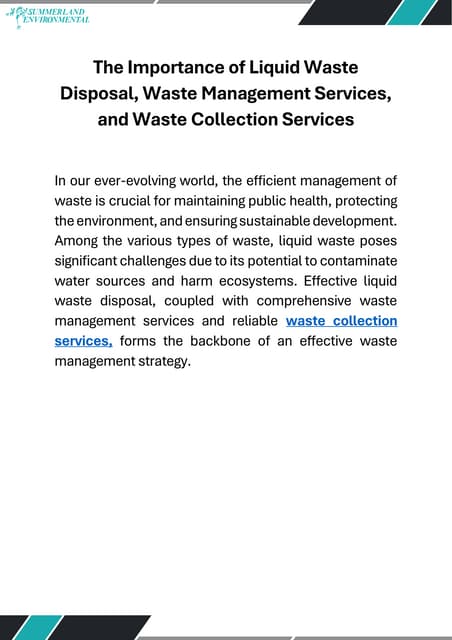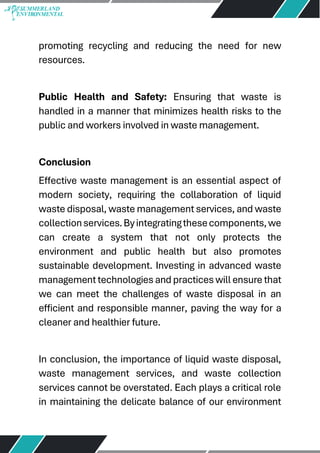Reclaim Waste Things To Know Before You Get This
Reclaim Waste Things To Know Before You Get This
Blog Article
All about Reclaim Waste
Table of ContentsSome Ideas on Reclaim Waste You Need To KnowMore About Reclaim WasteReclaim Waste - QuestionsThe Ultimate Guide To Reclaim WasteReclaim Waste for Dummies
Explore the kinds, incidents, and forms of fluid waste. Domestic sewer waste describes the waste and products from a household septic system. This type of waste is developed by people in residences, institutions, and other structures. This only includes septic systems that have a drain area. The proper administration and disposal of domestic sewage waste call for liquid waste to be transferred to a sewer treatment plant where the correct methods and tools are applied to detoxify and get rid of waste.
Industrial waste commonly consists of potential dangers, such as flammable materials or a mix of fluid and solid waste items, and needs an advanced and comprehensive disposal procedure. The disposal of business waste commonly includes the filtering of waste prior to transportation to guarantee secure and appropriate disposal. Industrial waste is created from by-products and drainage of industrial procedures and manufacturing.
This sort of waste can not use the exact same sewage monitoring transport or procedures as septic or industrial fluids. The industrial waste management process requires the assessment and screening of fluid waste prior to it undergoes the disposal process (industrial wastewater treatment). Runoff waste is the liquid waste that comes from runoff and excess stormwater in highly populated locations or cities
Drainage waste can create contamination and flooding otherwise taken care of correctly. Learn more about sewer cleansing and waste monitoring. Ensuring correct waste monitoring can protect against calamities and minimize environmental harm. Both people in household setups and experts in industrial or production sectors can take advantage of comprehending the processes and regulations of fluid waste administration.
Top Guidelines Of Reclaim Waste
Contact PROS Solutions today to learn concerning our waste management and disposal solutions and the proper methods to look after the liquid waste you generate.
(https://reclaimwaste1.weebly.com/)Do you recognize what occurs to your water when you end, purge the bathroom or drain pipes the cleaning machine? No? Well, it deserves understanding. This so-called 'wastewater' is not just an important resource however, after treatment, will certainly be released to our land, rivers or the ocean. Utilized water from toilets, showers, bathrooms, kitchen sinks, washings and industrial procedures is referred to as wastewater.

water made use of to cool machinery or clean plant and equipment). Stormwater, a form of wastewater, is runoff that flows from agricultural and city areas such as roof coverings, parks, gardens, roads, courses and seamless gutters into stormwater drains pipes, after rainfall. Stormwater flows without treatment directly to regional creeks or rivers, at some point reaching the ocean.
An Unbiased View of Reclaim Waste
In Queensland, most wastewater is dealt with at sewage treatment plants. Wastewater is delivered from residential or industrial sites via a system of sewers and pump terminals, understood as sewage reticulation, to a sewer treatment plant. City governments build, preserve and run most sewage treatment plants. Operators are certified under the Environmental Defense Act 1994 to release cured wastewater at an appropriate environmental requirement into waterways.
The Department of Natural Resources advises city governments concerning handling, operating and keeping sewerage systems and treatment plants. In unsewered areas, local federal governments might call for homeowners to install private or family sewer treatment systems to deal with domestic wastewater from toilets, kitchens, washrooms and laundries. The Division of Natural Resources authorises using household systems when they are confirmed to be reliable.
In some new communities, treatment of some stormwater to get rid of litter, sand and crushed rock has actually started making use of gross pollutant traps. Wastewater treatment happens in 4 phases: Gets rid of solid issue.
Wastewater then flows right into huge containers where solids work out and are gotten rid of as sludge. Oil and scum are skimmed from the surface. Makes use of little living microorganisms recognizes as micro-organisms to damage down and get rid of continuing to be dissolved wastes and great particles. Micro-organisms and wastes are incorporated in the sludge. Eliminates nitrogen and phosphorus nutrients that can create algal blossoms in our waterways and threaten water life.
Some Known Incorrect Statements About Reclaim Waste
Nutrient removal is not offered at all sewage treatment plants since it calls for expensive specialist devices. Clear i loved this fluid effluent generated after treatment might still have disease-causing micro-organisms - liquid waste removal melbourne.

Many wastewater flows into the sewerage system. Under the Act, regional federal governments carry out approvals and permits for ecologically relevant tasks (ERAs) including wastewater releases that could have a regional influence.
Reclaim Waste for Beginners
Surveillance offers accurate details about water quality and can validate that permit problems are being satisfied. The info acquired with surveillance provides the basis for making water high quality decisions.
Report this page